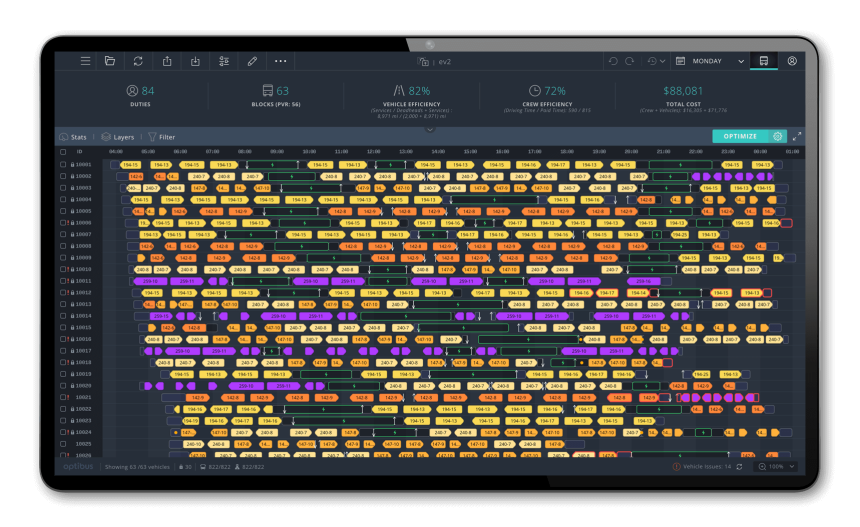Optibus is helping bus operators drive operational efficiency in a time of accelerated pace of change – and it’s not just for the UK’s Big Five
Efficient route planning and scheduling optimisation are crucial for fleet productivity. Going digital is one way to simplify and improve the process, as shown by Optibus.
The artificial intelligence (AI) platform helps bus operators plan and schedule their vehicles and drivers to improve the quality and reliability of services and make operations more efficient.
One of the biggest benefits of Optibus is being able to model and run scenarios far quicker than doing it manually. This is a huge advantage since the COVID-19 pandemic has accelerated the pace with which operators must respond to changing circumstances.
Dozens of transport agencies and operators worldwide responded to Optibus’ offer of free platform access in the early stage of the pandemic. During this time, one client experienced a 400% increase in the number of annual service changes.
“If you’re working manually or using Microsoft Excel or some other legacy software, these methods simply can’t work fast enough,” says Optibus’ VP Sales Europe Carmine Chiuchiolo.
“Optibus works much faster so you can make a service change within minutes or hours versus the days or weeks it takes using some of these other processes.”
Since the Optibus platform is cloud-native, it provides other important benefits. Not only is it immediately available for users – with no complicated hardware installations – but it also makes the sharing and collaboration of scheduling and planning work easier.
Says Carmine: “With Microsoft 365 or Google Workspace, you can share a document and review it with your colleagues halfway around the world. That’s what Optibus provides to operators that have depots in different locations. You can look at schedules, make changes and collaborate in real-time.”
New hires, new office

Despite COVID-19, the number of public agencies and private operators using Optibus doubled in 2020. Now, Optibus is on track to double its staff size for 2021.
To meet this growth, the firm has opened a new London office in Spitalfields. The larger office will focus on customer success and solutions engineering for clients throughout the UK and Europe.
Most new hires are in the customer success department to help onboard new platform users and ensure successful solutions to transport challenges. This includes the recent appointment of Customer Success Manager Jeremy Howat.
“It is an interesting time to join Optibus and watch the UK-EU office grow,” says Jeremy. “Our new office gives clients access to local people with local knowledge and expertise.
“It isn’t just about having staff in the right time zone; clients want to see us invested and engaged with the industry and practices, and that’s exactly what Optibus does. This is an important factor in our work with each partner around the globe.”
‘No one-size-fits-all approach’
It is not only the Optibus team that has gone through changes. There have also been many product updates and releases this year that operators can benefit from.
The Geospatial Suite, for instance, helps improve transport networks and transport equity using data-driven planning. Using geographic and demographic information, this feature can “significantly improve the accessibility, reliability and performance of networks”, says the firm.
Then there is Optibus’ “new and improved” electric vehicle (EV) module. Users can factor in charging locations and times to create schedules that are optimised for EVs. Not only does this make it easier to operate EV routes, but it can help operators meet regulatory requirements and bid for new EV business.
By working closely with operators, Optibus gets to know how they work and the challenges they face. This is what helps the business tailor its offering to meet the needs of any bus firm.
“There is no one-size-fits-all approach to transport planning,” says Dave Joshua, Optibus’ general manager for Europe. “Operators and agencies need customised solutions to local challenges, whether it’s determining an EV charging strategy or ensuring that local communities have access to public transport.
“No matter the fleet size, budget or location of a transport provider, we can create a customised solution for schedulers, operations teams and planners alike.”
Busting myths

In terms of pricing, Optibus is based on a licensing model to help suit all requirements, which Carmine describes as “like an à la carte menu”. This flexibility lets operators invest in precisely what they need and will use.
He adds: “Smaller operators don’t have to get all the bells and whistles if they’re only looking for a smart planning and scheduling tool. For other operators, we’ve got AI, machine learning and all the other fancy technical wizardry.”
A “cloud-native AI” platform may sound sophisticated and even out of reach for smaller operators. But the misconception that Optibus is for the UK’s Big Five bus operators only is one the firm is keen to quash.
“We understand that smaller operators are never going to have the same sort of budget and infrastructure as Stagecoach, for example,” says Carmine.
“So, we’ve got a very clear idea when it comes to helping smaller firms about how we can offer a return on investment and add value to their businesses.”
Adds Jeremy: “Regionally, Optibus has made excellent progress, with both First Bus and Stagecoach coming on board. The opportunity is now to extend the benefits of a cloud-native, algorithmic approach to more regional operators and authorities of all sizes.”
























